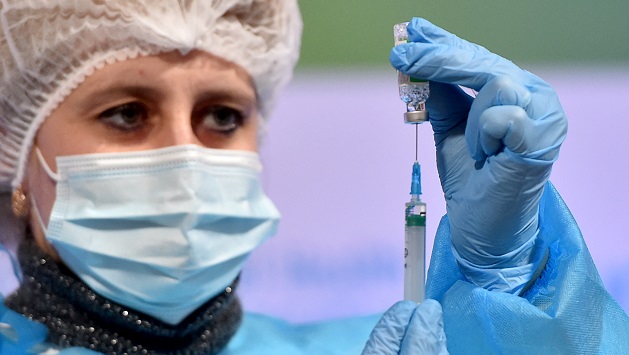
Sergei Supinsky/AFP/Getty Images
Sergei Supinsky/AFP/Getty ImagesBy ALLIE YANG, ABC News
(LONDON) — After reports of dangerous blood clots in some recipients, 10 European nations have paused the vaccine’s rollout, including some of the biggest: Germany, France, Italy, Spain and the Netherlands.
This vaccine, while not yet authorized in the U.S., has already been approved by dozens of countries, including many in Europe. On Tuesday, Europe’s top drug regulator Emer Cooke pushed back against safety concerns, saying there is “no indication that vaccination has caused these conditions.”
ABC News’ foreign correspondent James Longman told ABC News’ daily podcast “Start Here” that “millions upon millions of people have already” taken the AstraZeneca vaccine in Britain, “and there have not been any major side effects reported.”
AstraZeneca released a statement Sunday saying that of the 17 million people vaccinated in the EU and U.K., there has been “no evidence of an increased risk of pulmonary embolism, deep vein thrombosis (DVT) or thrombocytopenia in any defined age group, gender, batch or in any particular country. So far across the EU and U.K., there have been 15 events of DVT and 22 events of pulmonary embolism reported among those given the vaccine.”
The company said there have only been 15 cases of DVT and 22 cases of pulmonary embolism in the EU and U.K., which is “much lower than would be expected to occur naturally in a general population of this size and is similar across other licensed COVID-19 vaccines.”
“In terms of quality, there are also no confirmed issues related to any batch of our vaccine used across Europe, or the rest of the world,” the company said. “Additional testing has, and is, being conducted by ourselves and independently by European health authorities, and none of these re-tests have shown cause for concern.”
AstraZeneca emphasized that it was “keeping this issue under close review, but available evidence does not confirm that the vaccine is the cause. To overcome the pandemic, it is important that people get vaccinated when invited to do so.”
Longman said an EU study suggested one in 167,000 people who received the vaccine experienced blood clots. AstraZeneca said the risk might be even lower.
“Whatever you believe that to be, it is still fewer than the number of people who get blood clots in the general population,” Longman said. “It is definitely fewer than people who die of COVID-19. So there is a lot of outrage, really, in Britain especially, about this happening.”
The EU’s European Medicines Agency (EMA) said it is “working closely with the company [AstraZeneca], with experts in blood disorders, and with other health authorities” in an ongoing investigation into the reported blood clots.
The World Health Organization has also said “there is no indication of a link between the vaccine and blood clots, and that the vaccine can continue to be used while its investigation is ongoing.”
AstraZeneca was the vaccine European countries ordered the most of, Longman reported, in part because it’s mostly manufactured in Europe. Pfizer and others are mostly manufactured in the United States.
“AstraZeneca will say there is no proof that our vaccines are not working properly,” Longman said. “If you look at the real-world test case, which is the United Kingdom at the moment, then you’ll see there is no evidence.”
While the U.K. and U.S. made a bet on a smaller number of vaccine manufacturers, the European Union ordered vaccines from many different companies to spread risk in case one or more had problems.
“The U.K. and the U.S. [were] willing to take more risks when it comes to these things; our risks are paying off,” Longman said.
Many countries in continental Europe have been relatively slow to roll out vaccines, especially compared to neighbors like the U.K. and Israel, which have high vaccination rates. Many European countries are relying heavily on the AstraZeneca vaccine, but now, those vaccinations are on hold.
“This is really a mess,” Longman said. “As it stands right now, if you’re in your 20s or 30s now and you’re on the continent, you may not be getting any kind of vaccine until well past the summer.”
The pause of the AstraZeneca rollout in 10 European countries could have a much bigger effect around the world.
“The AstraZeneca vaccine is the $3 vaccine. It’s the vaccine which is going to help the developing world,” Longman said. “They badly need it. There are parts of the world calling out for this vaccine, and if the European Union continues to pour scorn on … the alleged inefficacy of this particular vaccine, then that really imperils the vaccination programs for developing countries and the entire planet.”
There is also concern the pause will further suspicions and doubt about the safety and efficacy of vaccines in general, Longman said.
“Europe has had a long problem with getting people on board with all kinds of vaccinations,” Longman said. “[I] had the AstraZeneca vaccine, there doesn’t seem to have been any real-world data in Britain to suggest that there are any negative side effects to taking this particular vaccine.”
This report was featured in the March 16 episode of “Start Here,” ABC News’ daily news podcast.
Copyright © 2021, ABC Audio. All rights reserved.